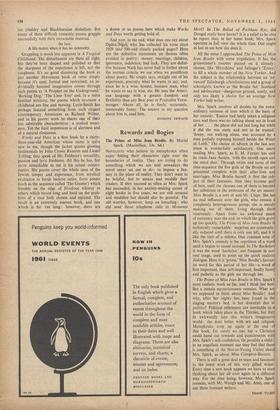Rewards and Bogies
NOVELISTS who believe in metaphysics often enjoy hitting their characters right over the boundaries of reality. They are trying to do something which we are told nowadays the novel never set out to do : to impose a fan- tasy in the place of reality. They don't want to be helpful, but to amaze and muddle their readers. If they succeed as often as Mrs. Spark has succeeded, in her anxiety-making career of eight books in five years, we are still amazed and muddled but should also be grateful. The old worries, however, keep on intruding: who did send those telephone calls in Memento
Mori? In The Ballad of Peckham Rye, did Dougal really have horns? It is a relief to be able to report that, in her latest book, Mrs. Spark operates in full view the whole time. One ought at last to see how she does it.
All the same I approached The Prime of Miss lean Brodie with some trepidation. It has the prizewinner's rosettes pinned on it already : chosen, like 'Hiroshima' and Salinger's "Zooey,' to fill a whole number of the New Yorker. And the subject is the relationship between an 'ad- vanced' Edinburgh schoolmistress and a group of schoolgirls, known as 'the Brodie Set.' Scotland and adolescence—dangerous ground, surely, and only too likely a choice for an average New Yorker lady writer.
Mrs. Spark resolves all doubts by the extra- ordinary sureness of tone which is the basis of her comedy. 'Eunice had lately taken a religious turn and there was no talking about sex in front of her . . . the phase did not last long but while it did she was nasty and not to be trusted.' 'Jenny, out walking alone, was accosted by a man joyfully exposing himself beside the Water of Leith.' The choice of adverb in the last sen- tence is wonderfully satisfactory. One starts reading Mrs. Spark, as E. M. Forster has said he reads Jane Austen, 'with the mouth open and the mind shut.' Through twists and turns of the time-sequence the five girls of the Brodie set are presented complete with their after-lives and marriages. Miss Brodie herself is first the sub- ject of their fantasies; then they become part of hers, until she chooses one of them to become her substitute in the embraces of the art master. Miss Brodie is a sort of anti-Mr. Chips, She has no real influence over the girls, who remain a completely heterogeneous group; she is merely making use of them, living through them vicariously. Apart from an awkward patch of summary near the end, in which the girls groWi up too quickly, The Prime of Miss Jean Brodie is technically remarkable . surprises are systematic ally reduced until there is only one left, and it is like the stab of a stiletto. One constant note of Mrs. Spark's comedy is the repetition of a word, until it begins to sound unusual In The Bachelors it was the word 'bachelor,' not frequent in cur- rent usage, used to point up the quick realistic, dialogue. Here it is 'prime,' Miss Brodie's favour-. ite word for this period of her life—a word at first important, then self-important, finally funny and pathetic as the girls see through her.
The Prime of Miss Jean Brodie is Mrs. Spark's most realistic work so far, and I think her best, But a certain mysteriousness remains. What are, we supposed to think about Miss Brodie? Andti why, after her nighty has been found in the, singing master's bed, is her downfall due to politics? Political references are inevitable in a book which takes place in the Thirties, but they fit awkwardly into this writer's imaginative world: she does better with sex and religion. Metaphysics crop up again at the end of, this book, for surely no one but a Christian'. could. hand out rewards and punishments witl Mrs. Spark's self-confidence. Or possibly a child :- in an ungallant moment one may feel that there; is something of the Not-so-Young Visiter about Mrs. Spark, as about Miss Compton-Burnett.
There is still a great deal to tease and fascinate in the latest work of this very gifted writer. Every time a new book appears we have to start thinking about her all over again in a different way. For the time being, however, Mrs. Spark remains, with Mr. Waugh and Mr. Amis, one of our three funniest writers.
FRANK TUOHY














































 Previous page
Previous page